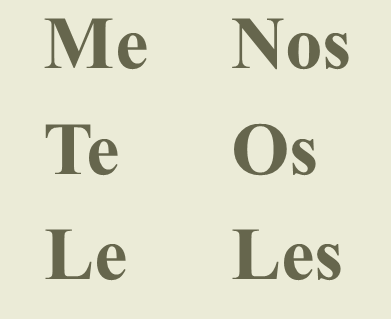7.3: Indirect Object Pronouns
- Page ID
- 44576
Before we start with Indirect Object Pronouns, it is important to review a couple of terms first:
Subject: The do-er of the action
Verb: The action, conjugated based on the Subject/ Do-er of the action
The Direct Object receives the action.
To easily identify the direct object, ask yourself who or what is being “verbed.”
From there, the The Indirect Object receives the direct object OR can be identified by determining to whom / for whom / from whom an action with a direct object is done.
For example:
I send my mom flowers./ Le mando flores (a mi mamá).
What’s being verbed? - - - The flowers/ flores
Who received the flowers? - - - My mom/ le...a mi mamá
I give my friends gifts./ Les doy regalos (a mis amigos).
What’s being verbed? - - - The gifts/ regalos
To whom was it given? - - - My friends/ les...a mis amigos
I make lunches for my kids./ Les preparo lonches (a mis hijos).
What’s being verbed? - - - The lunches/ lonches
For whom were they made? - - - My kids/ les…a mis hijos
The doctor is going to take a blood test (from me)/
El médico (a mí) me va a sacar una prueba de sange –o– “va a sacarme”
What’s being verbed? - - - The blood test/ la prueba de sangre
From whom was it taken? - - - Me/ (a mí)...me
When you have an indirect object in Spanish, you MUST use the indirect object pronoun, which is out of the ordinary (since we normally use pronouns as replacements).
Native speakers often use BOTH the indirect object and the indirect object pronoun for added clarification, emphasis, or just because they are in the habit of doing so. When using the actual indirect object, be sure to put “a” in front of the person’s name, title, or pronoun. I like to call it Additional or “A”ptional information.
Yes, it is strange that the indirect object pronoun is required and the indirect object itself is optional. Yes, it is redundant to use both. However, it is consider correct grammar and native speakers use both together all the time.
The indirect object
“A”ptional, Additional Information is used to clarify, to add emphasis, or “just because.”
Where the Additional information goes in the sentence is quite flexible.

|
The indirect object pronoun When you have an indirect object in your sentence, the pronoun is required. Shows to whom/ for whom/ from whom an action with a direct object is done. The indirect Object Pronoun goes in front of the conjugated verb. It can also be attached to an infinitive or an affirmative command: Tienes que decirme la verdad. ¡Dime la verdad!
|

Actividad 6
Los complementos indirectos. Fill in the blank with the correct indirect object pronoun. Use the Additional information provided in each sentence to help you.
1. Mis abuelos ________ regalan calcetines para la Navidad a mi hermano y a mí.
2. Yo ________ preparo la comida a mis hijos.
3. Yo ________ doy de comer a mis perros dos veces al día.
4. Profesora, ¿usted ________ va a dar una prueba a nosotros mañana?
5. Mi amor, a ti ________ doy mi corazón.
Actividad 7
Los complementos indirectos, a continuación. Fill in the blank with the correct indirect object pronoun, using the Additional information to help you. Then, identify the Subject and Verb of the sentence.
1. Mi novio nunca ________ da flores a mí.
Subject:
Verb:
2. Mi familia y yo ________ mandamos cartas a mi abuela porque ella no tiene email.
Subject:
Verb:
3. Los profesores ________ dan tarea a sus estudiantes.
Subject:
Verb:
4. Mi hermana ________ pide dinero a mi padre.
Subject:
Verb:
5. Marisol ________ enseña trucos a su perro.
Subject:
Verb:
6. Mi abuela ________ da besitos a mí.
Subject:
Verb:
7. Los técnicos de radiología ________ sacan radiografías a sus pacientes.
Subject:
Verb:
8. Yo ________ pido direcciones a Siri.
Subject:
Verb:



Actividad 8
Las traducciones. Fill in the blanks to complete the translations below. Use the word bank of verbs to assist you.
Dar – to give Prestar – to loan Pedir (e:i) – to order Mandar – to send
Leer – to read Servir (e:i) – to serve Decir (e:i) – to say/to tell (yo form digo)
Alquilar – to rent Traer – to bring (yo form traigo) Enseñar – to teach
Hacer – to make/ to do (yo form hago) Repetir (e:i) – to repeat
| I read a book to my daughters. | Yo ________ ________ un libro a ________. |
| The professor teaches us a lot of vocabulary. | La profesora ________ ________ mucho vocabulario. |
| My girlfriend brings me coffee. | Mi novia ________ ________ café. |
| I don’t loan my sister clothing. | Yo no ________ ________ ropa a ________. |
| My sister repeats the gossip to my mom. | Mi hermana ________ ________ los chismes a ________. |
| My boyfriend gives me a kiss. | Mi novio ________ ________ un beso. |
| My dad orders calamari for the group. | Mi papá ________ ________ calamares al grupo. |
| We tell you guys the good news. | Nosotros ________ ________ las buenas noticias a ________. |
| Who makes cookies for you (informal)? | ¿Quién ________ ________ galletas? |
| I rent my house to my friends. | Yo ________ ________ mi casa a ________. |
| Nobody tells me anything. | Nadie ________ ________ nada. |
| They don’t serve my husband lobster. | Ellos no ________ ________ langosta a ________. |


